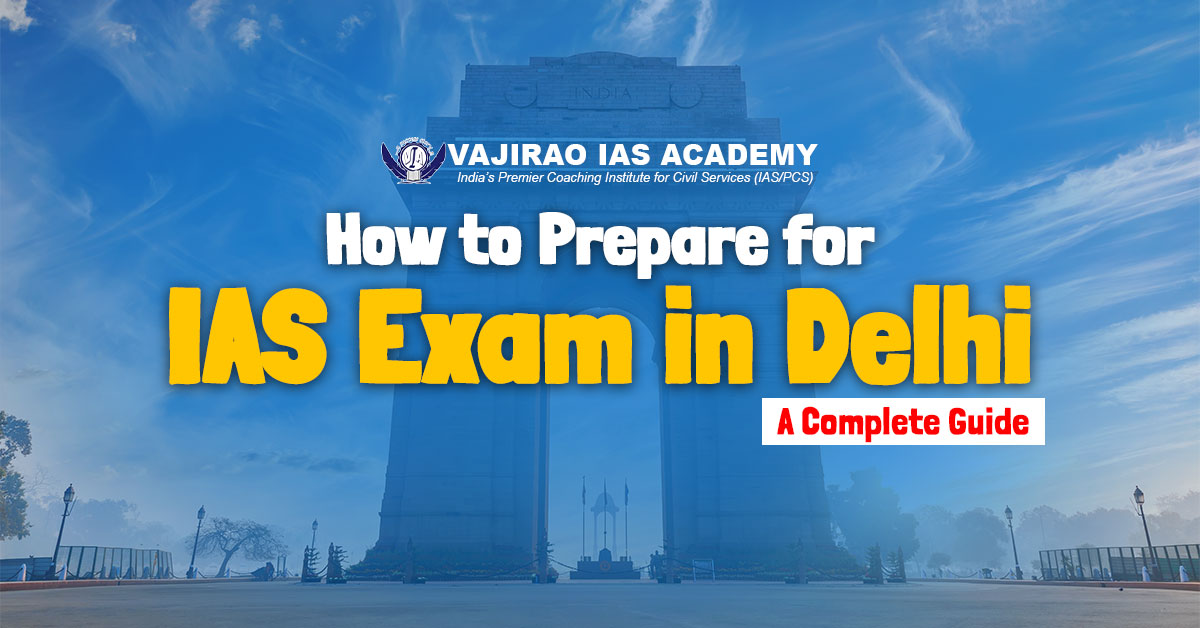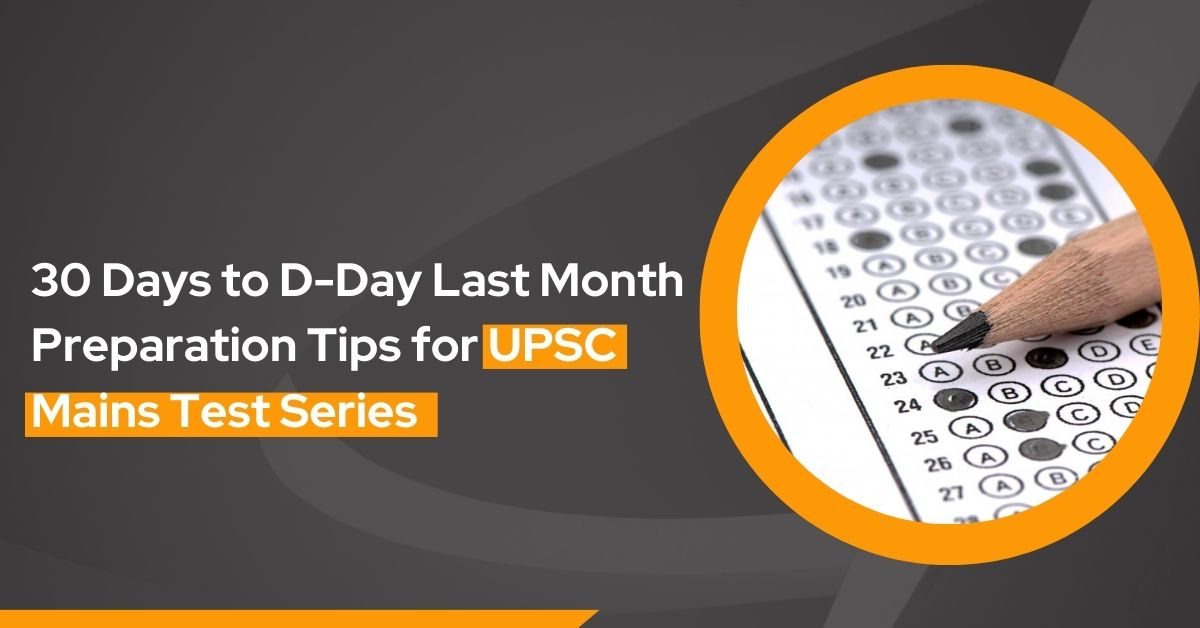Many students aspire to become civil servants in India and the most sought-after exam is the Indian Administrative Service (IAS) Exam. For those who are based in Delhi, the process of preparation can be overwhelming and time-consuming. This blog provides a comprehensive guide on how to prepare for IAS Exam in Delhi. With important tips, tricks and guidance from Vajirao IAS Academy, this blog will help you strategize your approach towards successfully clearing the exam.
Preparing for Civil Services from the best IAS Coaching Institutes in Delhi can be a daunting task. It requires hard work, commitment and dedication over a long period of time. To help you tackle this challenge, this article provides an all-inclusive guide on how to prepare for the IAS Exam in Delhi. This guide covers everything from understanding the exam structure and syllabus to tips on studying effectively and managing stress.
Understand the exam pattern and syllabus thoroughly
The IAS exam is considered one of the toughest exams in India, and it requires a lot of preparation. One of the most important things to do before starting your preparation is to understand the exam pattern and syllabus thoroughly. The IAS exam consists of three stages: Preliminary Examination, Main Examination, and Personality Test/Interview.
The Preliminary examination consists of two papers – General Studies (Paper-I) and Civil Services Aptitude Test (CSAT) (Paper-II). Both papers are objective type with multiple-choice questions. The Main examination has nine papers consisting of essay writing, language paper, general studies papers I-IV, optional subject paper I-II; each paper is descriptive type. The Personality test or Interview is the final stage in which candidates are interviewed by a board comprising senior officials.
It’s essential to go through each topic mentioned in the syllabus precisely as given by UPSC for all three stages. It’s recommended to make concise notes for every topic as small bullet points so that revision becomes more accessible later on during revision time. Understanding the exam pattern and syllabus will help you plan your study routine better and increase your chances of cracking the IAS Exam on your first attempt.
Create a study plan and schedule your study hours
Creating a study plan and scheduling your study hours are crucial steps in preparing for the IAS exam. The first step is to analyze the syllabus and divide it into smaller manageable sections. Prioritize topics according to their weightage in the exam, difficulty level, and your proficiency. Allocate sufficient time for each section based on your analysis.
Next, create a timetable that accommodates all the sections of the syllabus and fits into your daily routine. Ensure that you have enough time for revision and practice tests before the exam date. Stick to the timetable strictly but be flexible enough to make necessary adjustments if needed.
Finally, ensure that you take breaks in between study sessions to avoid burnout, increase productivity, and retain information effectively. Use this time for physical activities or hobbies that help you relax or refresh your mind before getting back to studying. With a well-planned study schedule and classes with the best civil services coaching centers in Delhi, consistent effort, and dedication towards achieving your goals, success in IAS exams is achievable even in Delhi’s competitive environment.
Gather study material such as books, notes, and online resources
One of the most important aspects of preparing for the IAS exam in Delhi is to gather study material. This includes books, notes, and online resources that cover the various subjects that are part of the exam syllabus. There are several sources from where you can obtain these study materials including bookstores, libraries, and online portals.
When selecting books for your IAS exam preparation, ensure that they cover all the topics and subtopics mentioned in the syllabus. Additionally, look for books that provide practice questions and mock tests to help you assess your understanding of each topic. Notes from coaching centers or previous year’s toppers can also be very helpful as they provide concise summaries of important topics.
Online resources such as blogs, websites and video lectures can also be a great addition to your study material collection. Online platforms like IASEXAM.COM offer comprehensive courses on all subjects required for IAS preparation along with mock tests and doubt-solving sessions. Remember to evaluate every resource carefully before investing time or money into it as there is a lot of misinformation available on various platforms which might hinder rather than aid your preparation efforts.
Join a coaching institute or online course if required
Joining a coaching institute or online course can be a great way to prepare for the IAS exam, especially if you are new to the field. The best UPSC Coaching Institutes in Delhi offer expert guidance and mentorship that can help you stay on track with your studies. They also provide access to study material, mock tests, and previous year question papers which can be helpful in preparing for the exam.
Online courses are becoming increasingly popular as they offer flexibility and convenience. Online courses also provide access to expert faculty, interactive study materials, doubt-solving sessions, and online test series that simulate actual exam conditions.
However, it is important to choose a reliable coaching institute or online course as there are many fraudulent ones out there. Do proper research before choosing one and read reviews from past students to make an informed decision. Remember that joining a coaching institute or online course is not mandatory but can be extremely beneficial in your preparation for the IAS exam.
Take mock tests and practice previous year question papers
Taking mock tests and practicing previous year question papers is an essential part of preparing for the IAS exam. It helps in understanding the format of the exam, types of questions asked, and time management. Mock tests also help in identifying weak areas that need improvement. Practicing previous year question papers can give an insight into the kind of questions asked in exams and their difficulty level.
One should start taking mock tests from the best IAS Coaching Centers in Delhi at least 3-4 months before the actual exam date. It is advisable to take at least one mock test every week and analyze it thoroughly to understand where you stand. The analysis should focus on identifying strengths, weaknesses, time management skills, accuracy level, etc.
Practicing previous year question papers can also help in improving memory retention by familiarizing oneself with frequently asked questions/topics. It’s important to focus on both static and current affairs-based topics while solving these papers as they cover a wide range of subjects. In conclusion, taking mock tests and practicing previous year’s question papers are indispensable tools for cracking IAS exams; it not only helps build confidence but also enhances one’s chances of success in this highly competitive examination.
Revise regularly and make notes for quick revision
Revising regularly and making notes is a crucial part of preparing for any competitive exam, including the IAS exam. It not only helps in retaining the information but also aids in quick revision during the last few days before the exam. Therefore, it is essential to revise regularly and make short notes that can be quickly revised.
One should aim to revise each topic at least thrice before moving on to new topics. The first revision should be within 24 hours of studying a new topic, followed by another revision after a week or two. The final revision should take place just before the exam for better retention of information.
In addition, making notes can help in summarizing important points from various sources like textbooks, reference books, newspapers, etc., which makes it easier to revise them later. Notes should be concise and precise and contain only essential information. One can use mnemonics or flowcharts to remember complex topics easily.
Overall, revising regularly and making notes is an effective way to prepare for the IAS exam as it helps in retaining information better and saves time during revisions. Therefore, aspirants must develop this habit early on in their preparation phase for better results in the long run.
Focus on your strengths but don’t ignore your weaknesses
It is a well-known fact that IAS exam is one of the toughest exams in India. It requires a lot of hard work, dedication and strategic planning to crack it. While preparing for the exam, one must focus on their strengths but not ignore their weaknesses.
Your strengths are your assets and they will help you sail through the exam with ease. However, ignoring your weaknesses can lead to failure. Therefore, it is important to identify your weaknesses and work on them accordingly.
For instance, if you are good at General Studies but weak in Mathematics or English language skills, then you must allocate more time to these subjects and practice regularly. By doing so, you will be able to overcome your weaknesses and enhance your chances of clearing the exam with flying colors.
Focusing on your strengths while working on your weaknesses is essential for cracking the IAS exam in Delhi. By balancing both aspects effectively, candidates can increase their chances of success in this highly competitive field.
Stay updated with current affairs and developments in different fields
To succeed in the IAS exam, it is essential to stay updated with current affairs and developments happening across various fields. As a civil servant, one must have a broad understanding of what’s happening around them and how it can impact society. Regular reading of newspapers and magazines can help candidates keep abreast of the latest happenings in national as well as international news.
Apart from traditional sources of information, candidates should also leverage the power of technology to stay informed. Social media platforms such as Twitter and LinkedIn are excellent resources for staying up-to-date on industry developments, technological advancements etc. Moreover, following thought leaders or influencers on these platforms can provide valuable insights into current affairs.
Keeping oneself updated with current affairs is an ongoing process that requires continuous effort and dedication. By actively engaging in this practice early on during their preparation for the IAS exam, candidates can not only enhance their chances of success but also develop crucial skills that will be valuable throughout their professional career.
Take breaks and maintain a healthy lifestyle
It is no secret that preparing for the IAS exam can be a grueling and stressful process. However, it is important to remember that taking breaks and maintaining a healthy lifestyle can greatly benefit your overall preparation. It may seem counterintuitive to take time away from studying, but research has shown that regular breaks can actually improve productivity and retention of information.
In addition to taking breaks, it is crucial to prioritize self-care during this time. This includes eating a balanced diet, getting enough sleep, and incorporating exercise into your routine. While it may be tempting to rely on caffeine or junk food for energy during long study sessions, these habits will ultimately do more harm than good in the long run.
Overall, while it may feel like there are not enough hours in the day to prepare for the IAS exam, remember that taking care of you should always come first. By prioritizing regular breaks and healthy habits, you will not only improve your chances of success on the exam but also maintain your well-being throughout the process.
Stay motivated and have a positive attitude towards the exam
Having a positive attitude towards the IAS exam is crucial to success. It’s important to remember that this exam is just another milestone in your journey and not the end-all-be-all of your future. To maintain motivation and a positive mindset, try breaking down your study schedule and the guidance from the best UPSC Coaching Centers in Delhi into manageable chunks. Set realistic goals for each day or week and celebrate small victories along the way.
It’s also helpful to surround yourself with positivity during this time. Avoid negative self-talk, and instead focus on what you have accomplished so far. Connect with like-minded individuals who are also preparing for the IAS exam or seek out support through online communities.
Ultimately, it’s important to remember that failure is not final. If you don’t succeed on your first attempt at the IAS exam, use it as an opportunity to learn from your mistakes and come back stronger next time. By staying motivated and keeping a positive attitude towards this challenging exam, you’ll be setting yourself up for success in both your academic and personal life.
In conclusion, preparing for the IAS exam can be a daunting task. However, with the right resources and preparation methods, it is possible to clear this prestigious exam successfully. It is important to have a plan of action in place and follow it diligently. Making use of the top coaching centers in Delhi, learning from experts and taking mock tests can help aspirants prepare for the IAS Exam. Apart from these tips and suggestions, having focus, dedication and confidence are also key components for success.




